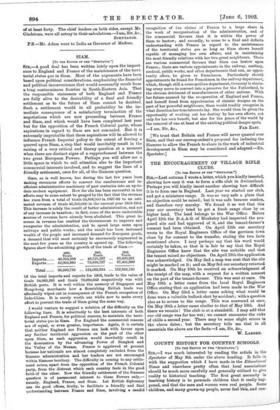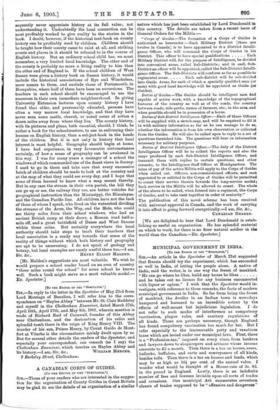COUNTY HISTORY FOR COUNTRY SCHOOLS.
[To THE EDITOR OF THE "SPECTATOR."]
was much interested by reading the article in the Spectator of May 9th under the above heading. It falls in with the suggestion which I have made in the Educational Times and elsewhere pretty often that local associations should be much more carefully and generally utilised to give reality to historical teaching. The first great necessity in teaching history is to persuade children that it really hap- pened, and that the men and women were real people. Some children, and many grown-up people, never feel this, and con-
sequently never appreciate history at its full value ; not understanding it. Undoubtedly the local connection can be most profitably worked to give reality to the stories in the book. I doubt, however, if the historical text-book on county history can be profitably used by children. Children should be taught how their county came to exist at all, and striking events and places in it should be referred to in the course of English history. Bub an ordinary school child has, we must remember, a very limited local knowledge. The other end of the county is probably no more a living reality to him than the other end of England is. If the school children of West Sussex were given a history book on Sussex history, it would include the historical associations of Rye and Winchelsea, mere names to them, and exclude those of Portsmouth, in Hampshire, where half of them have been on excursions. The teachers in each school should be encouraged to use the resources in their own immediate neighbourhood. In giving University Extension lectures upon county history I have found that older, and presumably educated, persons have often a very narrow local knowledge, and that they have never seen some castle, church, or noted scene of action a dozen miles away from where they live. The county history, with its pictures and plans, both essential, should, I think, be rather a book for the schoolmasters, to use in enlivening their lessons on English history, than a subject-book in the hands of the children. But it is not only in history that local interest is most helpful. Geography should begin at home. I have had experience, in very favourable circumstances certainly, of how a sense of geography can be awakened in this way. I was for many years a manager of a school the windows of which commanded one of the finest views in Surrey. I used to go in there and take care that every successive batch of children should be made to look at the country and at the map of what they could see every day, and I hope that some of them learned to know what a map meant thereby. But in any case the stream in their own parish, the hill they can go up or see, the railway they use, are better vehicles for geographical instruction than the Mississippi, the Himalayas, and the Canadian Pacific line. All children have not the luck of those of whom I speak, who lived on the watershed dividing the streams of the Arun, the Wey, and the Mole, who could Bee thirty miles from their school windows, who had an ancient British camp at their doors, a Roman road half-a- mile off, and a great battlefield of Danes and West Saxons within three miles. But certainly everywhere the local authority should take steps to teach their teachers that local association is a ready way towards that sense of the reality of things without which both history and geography are apt to be unmeaning. I do not speak of geology and botany, but local examples are surely useful there too.—I am,
[Mr. Malden's suggestions are most valuable. We wish he would prepare a school reader based on an area of country "three miles round the school" for some school he knows well. Such a book might serve as a most valuable model.— ED. Spectator.]











































 Previous page
Previous page